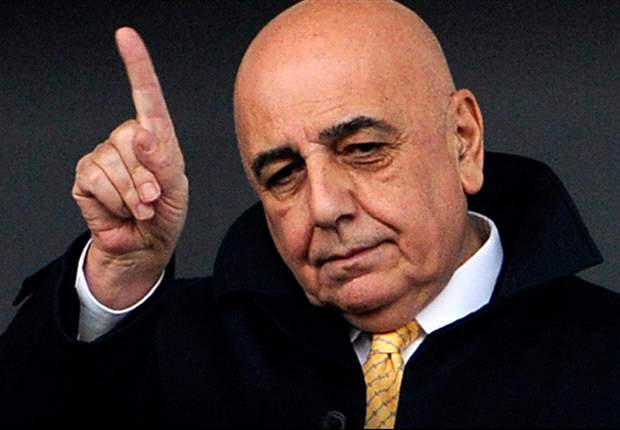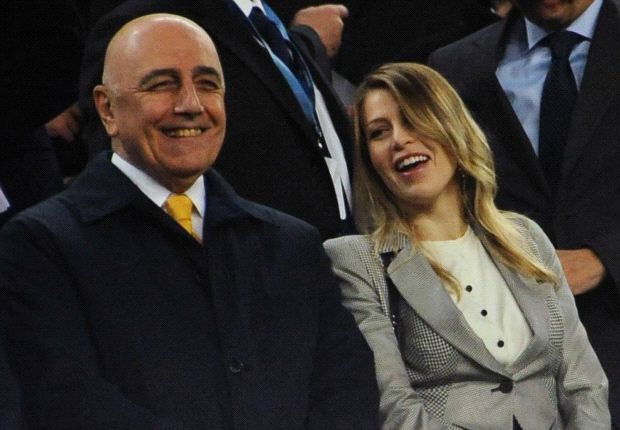
The Rossoneri CEO was once lauded as the best in the
business, but his fall from grace is now complete after he announced his
resignation on Friday
Once upon a time, Adriano Galliani had the best job in football. As vice-president and CEO of AC Milan, he got to play with somebody else’s money as he helped to build one of the most successful teams in the sport’s history.
A close friend of media entrepreneur president-come-politician Silvio Berlusconi, Galliani was arguably the key man behind the remarkable rise of the Rossoneri, which saw them collect five European Cups, eight Serie A championships and many other honours both at home and abroad.
With every new engagement Berlusconi took on in the pursuit of political advancement, Galliani increasingly became recognised as the man with much of the control at San Siro, as the likes of Ruud Gullit, Marco van Basten, George Weah, Ricardo Kaka and Andriy Shevchenko were brought in to take the club to a new level. With that success came plenty of praise, too. As transfer chiefs went, he was considered the best of the best.
 Adriano & Barbara | The boardroom power battle is looking increasingly one-sided
Adriano & Barbara | The boardroom power battle is looking increasingly one-sided"I will resign in the next few days, probably after the match against Ajax," Galliani told reporters.
"I will leave the club either with or without compensation.
"I understand that there comes a moment where it's time for change, but not like this. My reputation has been damaged. This should have been treated a bit more delicately."
Friday's news came as little surprise.
These days, Galliani has come across more as the big bad wolf than the man with the midas touch, as Milan’s fortunes continue to slump in the face of several underwhelming transfer campaigns and mounting financial constraints. In a world where so many coaches feel the backlash when their team is not performing, it is the CEO who has copped much of the flak at Milanello.
The very fact that Rossoneri boss Massimiliano Allegri has been able to deflect attention away from his coaching inadequacies and remain in a job says much about the hand he has been dealt by Galliani. If anything, the fact that Allegri is still in Milan’s employ has been used as another stick with which to beat the 69-year-old.
He hasn’t been helped by Silvio Berlusconi either. Whenever there has been a major signing in recent years, it seems to have been the club owner who has taken the entirety of the praise. When Zlatan Ibrahimovic and Robinho were signed in 2010, we were told – even by Galliani – that these were nothing less than generous gifts from the former Italian prime minister. Yet when Ibrahimovic was sold to balance the books and a buyer could not be found for the struggling Brazilian, it was Galliani who was made to shoulder most of the blame.
A series of disastrous signings haven’t exactly boosted Galliani’s share price, though. Following the sales of Ibrahimovic and Thiago Silva – for a fee €2 million shy of the one they had turned down only two weeks previously – to Paris Saint-Germain in 2012, €12.5m of that much needed cash was spent on Inter reserve Giampaolo Pazzini, with €4m going to Genoa for the signing of Francesco Acerbi. Further cash was splashed on first-team contracts for the likes of Bakaye Traore and Bojan Krkic, Bartosz Salamon and Cristiano Zaccardo over the coming months, but when Mario Balotelli was brought in from Manchester City, it was again Berlusconi who was attributed much of the credit.
| SIGNS OF DECLINE | Milan's transfer talent drain (2011-present) |
| INS |
OUTS |
||||
| PLAYER | FROM | COST | PLAYER | TO | CREDIT |
| Giampaolo Pazzini | Inter | €12.5m | Thiago Silva | PSG | €42m |
| Alessandro Matri | Juventus | €12m | Zlatan Ibrahimovic | PSG | €21m |
| Kevin Constant | Genoa | €8m | Alexandre Pato | Corinthians | €15m |
| Francesco Acerbi | Genoa | €4m | Kevin-Prince Boateng | Schalke | €10m |
| Bartosz Salamon | Brescia | €3.5m | Mathieu Flamini | Arsenal | free |
| Mattias Silvestre | Inter (loan) | €1m | Clarence Seedorf | Botafogo | free |
| Bojan Krkic | Barcelona (loan) | free | Andrea Pirlo | Juventus | free |
Last summer, Milan again dealt badly. For a club supposedly hoping to keep a tight rein on finances, the signing of Alessandro Matri was phenomenally baffling. Taking into account transfer fee, salary, taxes and additional fees, the striker’s move from Juventus will end up costing the Rossoneri in excess of €30m.
Add in the decision to turn down a €35m bid from PSG for Pato, only to sell him for just €15m one year later, and it is clear that Milan have fallen behind in the transfer market in recent years.
Galliani has been working with one hand behind his back thanks to Berlusconi’s delayed realisation that times are harder than they once were – particularly during the age of Financial Fair Play – but even considering that, the club’s dealings of late have been underwhelming at best. With no clear direction, an inability to identify and deal with the glaring issues at the back and in goal, and the continued insistence that Allegri is the right man for the job, there were plenty of reasons for fans to want Galliani out. Sticking by a coach is one thing, but standing by a man who has been unable to add anything tactically or technically to any of his players over a two-and-a-half year period as his team quickly declines is quite another.
The good news for Milanisti is that at least one person saw the need for a change of direction at San Siro - Barbara Berlusconi - and it has ultimately forced Galliani to jump before he was pushed. The young director has patiently developed her knowledge of the business in recent years, and looks set to take on more power and control from her father Silvio.
One must never forget the huge influence that Galliani has been in the past, but the present does not paint him in such a great light. He will be remembered as a Milan legend, but his decision to resign was the best for everyone concerned.


No comments:
Post a Comment